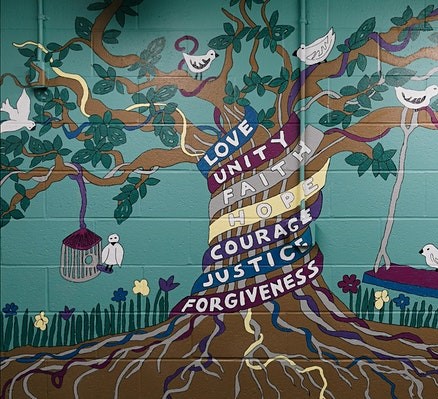Emerson College, Louis D. Brown Peace Institute, Center for Gun Violence Prevention at MGH Announce Transformative Collaboration to Change Narratives around Gun Violence; Launch Event on December 2

Three-year initiative is rooted in multi-disciplinary studio classes through Emerson’s Engagement Lab, community collaboration
Boston, MA – Emerson College, Louis D. Brown Peace Institute (LDBPI), and the Center for Gun Violence Prevention at Massachusetts General Hospital (MGH) announce a new collaboration to transform the narratives around gun violence, launching the initiative virtually on Thursday, December 2, at 2 p.m. The three-year, Boston-based collaboration will explore the incomplete narratives around the gun violence crisis and is determined through a collaborative venture, to model a new approach through interventions within media, arts, and communication and by centering those communities most impacted by this crisis.
On December 2, community members, faculty, institutional partners, and advocates will join event speakers to launch the initiative: Eric Gordon (Professor and Director of the Engagement Lab at Emerson College), David F. M. Brown, MD (President of Massachusetts General Hospital), Congresswoman Ayanna Pressley (MA-07), Andrea Campbell (Boston City Councilor), Peter Masiakos, MD and Chana Sacks, MD, MPH (Co-directors of the MGH Center for Gun Violence Prevention), Chaplain Clementina Chéry (President of the Louis D. Brown Peace Institute), and William Gilligan (Interim President of Emerson College).
“Together we will explore the roles of local news and reporting, place-based media art, participatory documentary, storytelling, performing arts, and social media influencers on transforming those narratives around gun violence,” said Eric Gordon, Director of the Engagement Lab at Emerson College, which has created three new studio courses for the Spring semester that will support this initiative.
Gun violence is a pervasive public health crisis in this country. Forty-four percent of Americans today know someone who has been shot, and nearly every American will know someone who has been shot during their lifetime, according to the Centers for Disease Control and Prevention. How do we understand the impact of gun violence on individuals, families, and communities? What are their stories, and are these narratives told with dignity, and urgency, or have we as a society normalized them?
“All of us share an obligation to understand the causes and social determinants of these devastating injuries – and to prevent them from occurring,” said Masiakos, director of MGH Pediatric Trauma Services. “Health care providers talk about gun violence being our lane, but we cannot ignore the people in the middle of the highway being hit by trucks day after day. Telling these stories in authentic and compelling ways will have a profound impact on the way our society embraces and addresses this public health epidemic.”
“When we think about sustainable change and shifting the narrative it is done through partnerships like this, where intervention and education is taking place at multiple levels. The investment in proximity is a vital piece to this partnership and I am eager to see this long standing vision of the LDBPI come to fruition,” said by Chaplain Clementina Chéry, President/CEO of the Louis D. Brown Peace Institute.
Aiming to create a continuum of change, Transforming Narratives of Gun Violence will engage in open exploration through sustained partnerships with community-based organizations on the ground working for gun violence prevention, advocacy, and victim support services. Students enrolled in multi-disciplinary studio classes at Emerson College’s Engagement Lab will work alongside community partners to transform narratives of gun violence in Boston by understanding and representing the social complexity of the problem. Together, they will explore the roles of local news and reporting, place-based media art, participatory documentary, storytelling, performing arts, and social media influencers on transforming those narratives.
Through a collaborative design approach, this initiative will center those most impacted by the effects of gun violence in the exploration and creation of narrative interventions to restore urgency, dignity, and humanity to this pervasive issue.
About Emerson College
Based in Boston, Massachusetts, opposite the historic Boston Common and in the heart of the city’s Theatre District, Emerson College educates individuals who will solve problems and change the world through engaged leadership in communication and the arts, a mission informed by liberal learning.
The College has 3,700 undergraduates and 1,400 graduate students from across the United States and 50 countries. Supported by state-of-the-art facilities and a renowned faculty, students participate in more than 90 student organizations and performance groups.
Emerson is known for its experiential learning programs in Los Angeles, Washington, DC, the Netherlands, London, China, and the Czech Republic as well as its new Global Portals.
The College has an active network of 51,000 alumni who hold leadership positions in communication and the arts.
For more information, visit emerson.edu
About the Louis D. Brown Peace Institute
The Louis D. Brown Peace Institute (LDBPI), founded in 1994, is a center of healing, teaching and learning for families and communities impacted by murder, trauma, grief and loss. The vision of the LDBPI is to create and sustain communities where all people are valued and all families can live in peace.
The Louis D. Brown Peace Institute’s programs and services are grounded in the Center for Disease Control and Prevention’s (CDC) social-ecological framework that interventions are needed at multiple levels to interrupt cycles of violence.
The heart of their work is with families impacted by murder on both sides. Their impact extends to community and society through services, advocacy and training.
About the Center for Gun Violence Prevention at Massachusetts General Hospital
The Center for Gun Violence Prevention is a multidisciplinary initiative at Massachusetts General Hospital dedicated to preventing firearm-related violence and promoting safety in the homes and communities of the patients we serve.
The Center focuses on reducing injuries and deaths related to firearms and promoting safety in the home and in the community through clinical care and education, community engagement and research.
